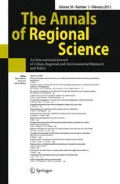Abstract
Rural communities are intensively based on social capital, the potential of which might seem limited in terms of the possibility to expand beyond rural areas. Today, entrepreneurs, the main actors in achieving and sustaining rural development, have a unique opportunity in the exploitation of social capital in rural areas by utilizing the digital platforms. These new online entrepreneurs have become critical to the success of rural areas as they mobilize online resources to exploit the full potential of their local products in the global economy, thus remaining local while acting global. This process is illustrated by the development of the alternative food network as well as social networks that connect rural potential to the rest of the world. This paper aims to understand the role of such social networks in e-commerce by analysing entrepreneurial characteristics and the ecosystem of their enterprises through case studies. In addition, the network characteristics of chosen enterprises are examined under three main subjects: (i) types of relations with rural residents; (ii) relations with suppliers (both producers and logistics); and iii) the extent of their networks in the e-marketplace. Online entrepreneurs whose business is related to rural agricultural products are selected as case study examples. The data are derived from the results of interviews, and visuals are used to map out their entrepreneurial networks and ecosystems. The conclusions of this paper are: (i) by using online channels, rural entrepreneurs are able to broaden their market; (ii) agricultural lands are being protected since rural entrepreneurs use the potentials of local natural resources; and (iii) these enterprises are financially self-sustaining. The positive impact on local rural development by online rural entrepreneurs is obvious. However, to expand this impact on a regional scale, the promotion of public policies and planning are necessary.





Similar content being viewed by others
References
Akgün AA, Nijkamp T, Baycan-Levent P, Brons M (2010) Embeddedness of entrepreneurs in rural areas: a comparative rough set data analysis. Tijdschrift voor economische en sociale geografie 101(5):538–553. https://doi.org/10.1111/j.1467-9663.2010.00630.x
Akgün AA, Baycan-Levent T, Nijkamp P, Poot J (2011) Roles of local and newcomer entrepreneurs in rural development: a comparative meta- analytic study. Reg Stud 45(9):1207–1223. https://doi.org/10.1080/00343401003792500
Akgün AA, Baycan T, Nijkamp P (2015) Rethinking on sustainable rural development. Eur Plan Stud 23(4):678–692. https://doi.org/10.1080/09654313.2014.945813
Barbera, F., Corsi, A., Dansero, E., Giaccaria, P., Peano, C., Puttilli, M. (2014). What is alternative about alternative agri-food networks? A research agenda towards an interdisciplinary assessment, Firenze University Press, 2, 45–54. Retrieved from http://www.fupress.net/index.php/SdT/article/viewFile/14322/13303
Beckie MA, Kennedy EH, Wittman H (2012) Scaling up alternative food networks: farmers’ markets and the role of clustering in western Canada. Agric Hum Values 29(3):333–345. https://doi.org/10.1007/s10460-012-9359-9
Capello R (2008) Regional economics in its 1950s: Recent theoretical directions and future challenges. Ann Reg Sci 42(4):747–767. https://doi.org/10.1007/s00168-007-0185-8
Çelik N (2006) Türkiye- Avrupa Birliği Tarım Politikaları. İstanbul, Heinrich Böll Stiftung Derneği
Dansero E, Puttilli M (2014) Multiple territorialities of alternative food networks: six cases from Piedmont, Italy. Local Environ 19(6):626–643. https://doi.org/10.1080/13549839.2013.836163
Eraydın, A. (2002). Yeni sanayi odakları: yerel kalkınmanın yeniden kavramsallaştırılması. ODTÜ Mimarlık Fakültesi
Goetz, S. J. (2013). Entrepreneurship. In Green, G. P. (Ed.), Handbook of Rural Development, 139–157. Retrieved from http://0- www.elgaronline.com.divit.library.itu.edu.tr/view/9781781006702.xm l
Gökmen A (2012) Virtual business operations, e-commerce and its significance and the case of Turkey: current situation and its potential. Electron Commer Res 12(1):31–51
Green, G. P. & Zinda, J. A. (2013). Rural development theory. In Green, G. P. (Ed.), Handbook of Rural Development, 3–20. Retrieved from http://0- www.elgaronline.com.divit.library.itu.edu.tr/view/9781781006702.xm l
Henderson, J. (2002). Building the rural economy with high- growth entrepreneurs, Economic Review, 87(Q III), 45–70. Retrieved March 11, 2016 from https://www.kansascityfed.org/publicat/econrev/pdf/3q02hend.pdf
Ilbery B, Maye D (2006) Retailing local food in the Scottish-English borders: A supply chain perspective. Geoforum 37:352–367. https://doi.org/10.1016/j.geoforum.2005.09.003
Jarosz L (2008) The city in the country: Growing alternative food networks in metropolitan areas. J Rural Stud 24:231–244. https://doi.org/10.1016/j.jrurstud.2007.10.002
Korsgaard S, Müller S, Tanvig HW (2015) Rural entrepreneurship or entrepreneurship in the rural – between place and space. Int J Entrepreneurial Behav Res 21(1):5–26. https://doi.org/10.1108/IJEBR-11-2013-0205
Marsden T, Banks J, Bristow G (2000) Food supply chain approaches: exploring their role in rural development. Sociol Rural 40(4):424–438. https://doi.org/10.1111/1467-9523.00158
Marsden T (2009) Mobilities, vulnerabilities and sustainabilities: Exploring pathways from denial to sustainable rural development. Sociol Rural 49(2):113–131. https://doi.org/10.1111/j.1467-9523.2009.00479.x
Maumbe, B. (2013). Global e-agriculture and rural development: e-value creation, implementation challenges, and future directions. In Maumbe, B& Patrikakis, C. Z. (Eds.), E-Agriculture and Rural Development: Global Innovations and Future Prospects, 1–15. Retrieved from http://www.igi-global.com/gateway/book/69198
Mulgan G (2006) The process of social innovation. Innov Technol Gov, Glob 1(2):145–162
Pacciani, A., Belletti, G., Marescotti, A., Scaramuzzi, S. (2001). The role of typical products in fostering rural development and the effects of regulation (EEC) 2081/92, The 73rd Seminar of the European Association of Agricultural Economists, Ancona, Italy: June 28–30.
Ray C (1998) Culture, intellectual property and territorial rural development. Sociol Rural 38(1):3–20. https://doi.org/10.1111/1467-9523.00060
Renting H, Marsden T, Banks J (2003) Understanding alternative food networks: exploring the role of short food supply chains in rural development. Environ Plan 35:393–411. https://doi.org/10.1068/a3510
Salenbacher J (2015) Creative Personal Branding: The strategy to answer what’s next? CPB lab, Barcelona
Seyfang G, Longhurst N (2016) What influences the diffusion ofgrassroots innovations for sustainability? Invest community curr niches, Technol Anal Strateg Manag 28(1):1–23. https://doi.org/10.1080/09537325.2015.1063603
Sharma P (2013) Rural entrepreneurship, science and technology and innovations in farm based entrepreneurship venture: A case study of a farmer inventing accustomed machine for tillage farming. Int J Innov Res Develop 2(4):6–14
Sonnino R, Marsden T (2006) Beyond the divide: rethinking relationships between alternative and conventional food networks in Europe. J Econ Geogr 6(2):181–189. https://doi.org/10.1093/jeg/lbi006
TURKSTAT - Turkish Statistical Institute (2019) Labour Force Statistics
van der Ploeg JD, Renting H, Brunori G, Knickel K, Mannion J, Marsden T, De Roest K, Sevilla-Guzmán E, Ventura1, F. (2000) Rural development: from practices and policies towards theory. Sociol Rural 40(4):391–408. https://doi.org/10.1111/1467-9523.00156
Wortman MS Jr (1990) Rural entrepreneurship research: An integration into the entrepreneurship field. Agribusiness 6(4):329–344. https://doi.org/10.1002/1520-6297
World Bank, (2019). https://databank.worldbank.org/reports.aspx?source=2&type=metadata&series=NY.GDP.MKTP.CD#
Author information
Authors and Affiliations
Corresponding author
Additional information
This paper is based on Burcu Yaşlak’s unpublished MSc Thesis entitled “Online Entrepreneurship as a Strategy for Rural Development: Case of Turkey” from Istanbul Technical University, 2016.
Rights and permissions
About this article
Cite this article
Yaşlak, B., Akgün, A.A. & Baycan, T. Social networks of online rural entrepreneurs: the case of Turkey. Ann Reg Sci 70, 705–721 (2023). https://doi.org/10.1007/s00168-020-01034-x
Received:
Accepted:
Published:
Issue Date:
DOI: https://doi.org/10.1007/s00168-020-01034-x






